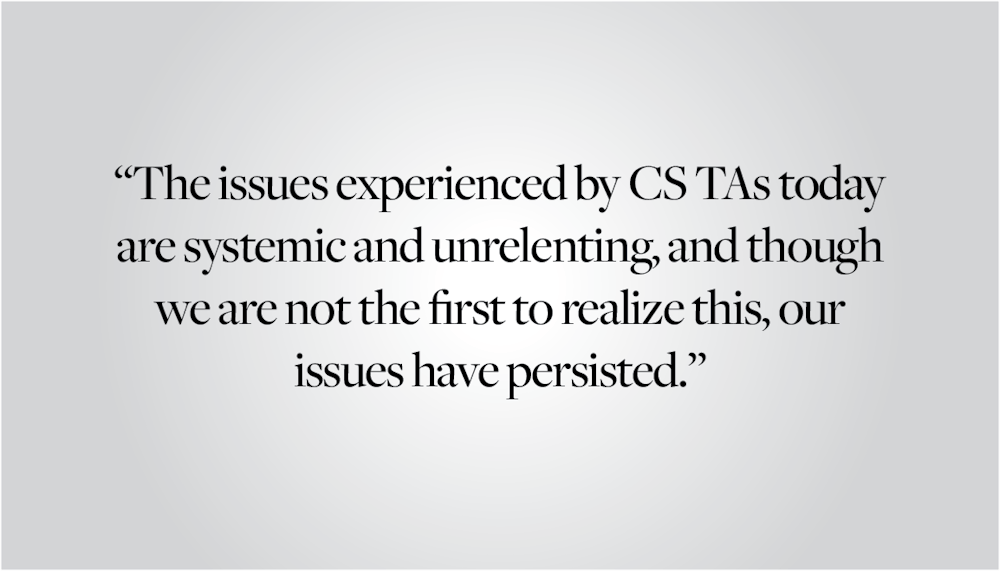This week, undergraduate teaching assistants in Brown’s Department of Computer Science will vote to determine whether the Brown administration must legally recognize and bargain with our union, the Teaching Assistant Labor Organization. We are pursuing unionization because we believe in democracy, justice, equity and a spirit of collaboration, care and community. These values stand in contrast to how the department is currently run, as it’s no secret that the program is riddled with difficulties surrounding TA working conditions. We implore CS TAs to vote “yes” this week to improve our workplace and our community by winning the first undergraduate union on campus.
Today, CS TAs must often and unfairly choose between their responsibilities as workers and their lives as students and people. TAs serve as the face of their courses, sometimes even playing the role of professors. This is not just because our CS TAs are hardworking and ambitious, but rather because they are overworked and exploited. For example, the head teaching assistant job description explicitly instructs TAs that they “should do whatever (they) feel is important to keep the class running smoothly,” leaving no room to consider the intense pressure and emotional burden that comes with that responsibility. The department fosters an environment where working overtime is not always a choice, but an obligation — the alternatives are either burdening their fellow TAs with more work or letting students suffer the consequences.
These issues could seem like acute one-offs or just fallout from the COVID-19 pandemic. Unfortunately, this couldn’t be further from the truth. In 2019, Arthur Borém ’20 led a short-term research project studying the CS TA program, which resulted in a research paper co-authored with the Sheridan Center’s Associate Director for Undergraduate STEM Development Christina Smith. It describes the tensions and pressures that TAs faced back then, and they’re nearly identical to the issues that TAs face today, four years later. TAs noted that “the presence and influence of professors (are) not guaranteed,” while developing course content. Similarly complex responsibilities, such as managing grades or writing rubrics, were performed “without training or guidance.” Just like today, TAs felt “like they (were) ‘failing’ their students when prioritizing their own schoolwork.”
In the same year, 2019, the University formed a working group composed of students and faculty from multiple different departments that reviewed University practices for all TAs, resulting in a set of revised guidelines that were approved in 2021. The working group included Borém and Smith as well as Tom Doeppner, the current vice chair of the Department of Computer Science. In the executive summary of their review, the working group cited the issues identified in Borém and Smith’s paper and found that for TAs across the University, the situation was unacceptable.
The report noted that TAs were engaging in complex teaching practices, such as course development, without much support. There were also concerns about equity gaps, “access to TA opportunities themselves” and the administrative process: “There is not much consistency in regards to recruitment, hiring, training, and supervision of TAs.”
This report was revealing, but ultimately, the working conditions of TAs did not change. In Spring 2022, a group of TAs authored an open letter that they presented to administrators in the computer science department. Again, the same issues — overwork, inadequate pay, insufficient infrastructure — were outlined. But, other than winning a nominal pay raise, little changed.
The issues experienced by CS TAs today are systemic and unrelenting, and though we are not the first to realize this, our issues have persisted.
By building a union, we aim to address these issues by fighting against the continual churn of the undergraduate condition, which erodes institutional memory. As CS TAs, we are temporary workers in a deeply decentralized workplace. We’re spread across dozens of courses in a given semester, working in different roles, all with their own responsibilities and histories. Most TAs only work for one or two semesters and graduate in four years. While our union’s membership will change over time, TALO’s power to preserve our experiences and centralize our efforts — both formally and informally — will remain.
Winning a union is not just about looking to the past and securing better conditions for TAs — it’s also about protecting students’ futures. The work culture in college primes students to expect and accept mistreatment from employers. Tech companies seek workers who will put their jobs first, clock 80-hour weeks and run on little sleep and a lot of caffeine. Recently, we have been reminded of tech workers’ working-class positionality, as loyal senior developers and new grads alike are laid off as companies brag about record profits.
Brown facilitates this culture of overwork by asking students, TAs, faculty and staff alike to sacrifice mental and physical health for programming assignments, academic paper deadlines and recruitment cycles. As students, we find ourselves taking classes that we hope will teach us marketable technical skills rather than challenge us to explore new ideas. We spend our free time studying for interviews, taking online assessments and building projects to put on our resumes. And, we accept course loads that quite literally have us working overtime — three CS courses in one semester can easily add up to more than 40 hours of work a week.
Interrupting this culture of overwork starts with our union. TA working conditions set an example for how all CS students expect to be treated as workers. As first-years, many of us looked up to our TAs as mentors and role models. But, when we see our mentors stay after hours or work while they’re not on the clock, we are implicitly told that overwork and a lack of boundaries are not only the norm — they are expected.
As TALO, we are organizing to protect students and TAs by fostering transparency and accountability. Currently, the department and University are under no obligation to include us in decisions that impact our everyday working conditions or even provide a transparent explanation of their decision-making processes. A clear example of this is Brown’s recent decision to pause all TA hiring until after the March 2 union election. Not only did this unexplained move create an immediate headache for the meta TAs who oversee hiring, but it threatened to push hiring timelines into finals period and the summer. After public pushback against this decision, the administration opted to resume hiring. This is the power we wield when we stand together. This is the power of a union.
Voting “yes” for our union is the first step to building a department where TAs’ experiences are preserved and valued, where TAs have a real voice in their working conditions and where students receive the world-class CS education that Brown promises.
Ronnie Shashoua ’25 can be reached at ronnie_shashoua@brown.edu. Yasmine Abdelaziz ’25 can be reached at yasmine_abdelaziz@brown.edu. Joseph Maffa ’25 can be reached at joseph_maffa@brown.edu. Please send responses to this opinion to letters@browndailyherald.com and other op-eds to opinions@browndailyherald.com.

Joe Maffa is the editor-in-chief of post- Magazine. He studies CS and enjoys collecting cute trinkets, doing crosswords and cooking!





